Next Gen Helen McRae Leveraging the body’s own immune response for more effective cancer therapies
Raised in Victoria, Australia, McRae became enthralled with science in high school. “When my older brother told me about evolutionary theory, it sounded so cool!” says McRae, “I wanted to learn more about how our genes evolved and their role in health and disease.”
McRae later pursued her bachelor’s degree in genetics at the University of Melbourne. She didn’t know what a career in science entailed at the time—she was just passionate about learning. She eventually joined a structural biology lab at the Walter and Eliza Hall Institute, where she studied cell-to-cell signaling molecules and a protein involved in preventing programmed cell death. Unfortunately, after only six months she experienced a common peril within academic research: the project ran out of funding, and she could no longer continue her work. Luckily, she found a new research opportunity at the same institution, where she stayed for her PhD work examining the genetic mutations related to blood cell formation disorders, such as leukemia. She valued the ability to collaborate with her colleagues, and Salk’s highly collaborative environment is one of the reasons she chose to move to San Diego for her postdoctoral studies.
“I’ve admired Associate Professor Diana Hargreaves’ work since I was in graduate school. She is dedicated to mentoring her trainees and supporting them as they learn new techniques, so when the opportunity arose to join her lab, I couldn’t say no,” says McRae.
In Hargreaves’ lab at Salk, McRae investigates immune cells called macrophages and ways to control them to target cancer. Normally, macrophages help fight off infections. But in tumors, these cells support the growth of cancer cells by promoting blood vessel development and suppressing other anti-cancer immune cells. McRae believes macrophages could be altered to become tumor-fighting cells, which could lead to new types of immunotherapies for cancer patients.
The impact of McRae’s work has not gone unnoticed—she has received numerous awards for her achievements in science. Recently, she received the Catharina Foundation Postdoctoral Fellowship, the Tang Prize Foundation Fellowship, the Salk Women & Science Special Award, the American-Australian Association Graduate Fund Scholarship, and the Cancer Research Institute Merck Fellowship.
Though she has thrived at Salk, the transition to San Diego wasn’t entirely smooth. Soon after McRae arrived, the coronavirus pandemic reached the US, leaving her separated from her fiancé in Australia. After two years, the couple decided to get married over Zoom. “Although not an ideal situation, it worked out great!” she says. “We had people from all around the world attend
the ceremony.”
When travel restrictions finally loosened up, McRae flew back to Australia for an immunology conference, and she was able to see her now-husband for the first time. “We were both wearing masks, so it wasn’t quite the rom-com reunion!” she says. “But I was elated that we could finally be together as a married couple.” They both now live in San Diego, where they swim, run and occasionally surf.
Although McRae wasn’t initially sure where her interest in genetics would lead, it’s provided her with incredible opportunities to propel her career and study immunotherapy. “I don’t know what’s next, but for now I enjoy researching tumor-associated macrophages, in the hopes we can unleash the potential of our immune system to fight cancer.”
Featured Stories
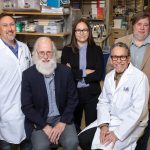 The Salk Institute and Lustgarten Foundation form strategic pancreatic cancer research partnershipSupported by a $5 million grant, the partnership aims to identify and validate potential targets for new pancreatic cancer drugs. Four participating labs, led by Salk Professors Reuben Shaw, Ronald Evans, Tony Hunter and Assistant Professor Dannielle Engle, will bring their individual areas of complementary expertise to bear on the collaborative goal.
The Salk Institute and Lustgarten Foundation form strategic pancreatic cancer research partnershipSupported by a $5 million grant, the partnership aims to identify and validate potential targets for new pancreatic cancer drugs. Four participating labs, led by Salk Professors Reuben Shaw, Ronald Evans, Tony Hunter and Assistant Professor Dannielle Engle, will bring their individual areas of complementary expertise to bear on the collaborative goal.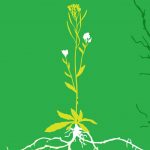 The weed that changed the worldHow Arabidopsis thaliana became one of the most important tools in science—and how the information the small weed has revealed over decades of research now enables the development of Salk Ideal PlantsTM, a new generation of food crops that are better equipped to both thrive in a changing climate and help mitigate it.
The weed that changed the worldHow Arabidopsis thaliana became one of the most important tools in science—and how the information the small weed has revealed over decades of research now enables the development of Salk Ideal PlantsTM, a new generation of food crops that are better equipped to both thrive in a changing climate and help mitigate it.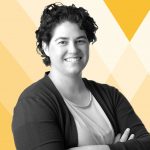 Courtney Glavis-Bloom — Shining the spotlight on aging to find a cure for Alzheimer’s diseaseSenior Staff Scientist Courtney Glavis-Bloom’s work is driven by her experience caring for her grandparents, who were diagnosed with Alzheimer’s disease when she was in high school. She saw firsthand how dementia robs individuals of their connections to the world—now she studies the brain areas affected in aging in the hope of finding a cure.
Courtney Glavis-Bloom — Shining the spotlight on aging to find a cure for Alzheimer’s diseaseSenior Staff Scientist Courtney Glavis-Bloom’s work is driven by her experience caring for her grandparents, who were diagnosed with Alzheimer’s disease when she was in high school. She saw firsthand how dementia robs individuals of their connections to the world—now she studies the brain areas affected in aging in the hope of finding a cure.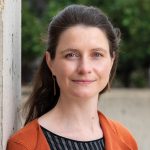 Helen McRae — Leveraging the body’s own immune response for more effective cancer therapiesHelen McRae was a graduate student when her cousin was diagnosed with lung cancer and received immunotherapy—an approach that empowers a patient’s own immune system to destroy tumors. McRae saw the promise of this newer treatment, but also how much more research is needed to help it work for more people.
Helen McRae — Leveraging the body’s own immune response for more effective cancer therapiesHelen McRae was a graduate student when her cousin was diagnosed with lung cancer and received immunotherapy—an approach that empowers a patient’s own immune system to destroy tumors. McRae saw the promise of this newer treatment, but also how much more research is needed to help it work for more people.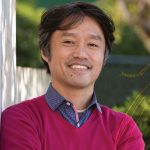 Kenta Asahina – Flying into the future of technology and innovationOriginally from Japan, Associate Professor Kenta Asahina grew up exploring nearby farmlands with his two brothers in search of insects and plants. Their dad enjoyed taking them to the mountains and national parks. These experiences inspired his interest in the natural world, and Asahina now studies how genetics impact fruit fly behavior.
Kenta Asahina – Flying into the future of technology and innovationOriginally from Japan, Associate Professor Kenta Asahina grew up exploring nearby farmlands with his two brothers in search of insects and plants. Their dad enjoyed taking them to the mountains and national parks. These experiences inspired his interest in the natural world, and Asahina now studies how genetics impact fruit fly behavior.






















































